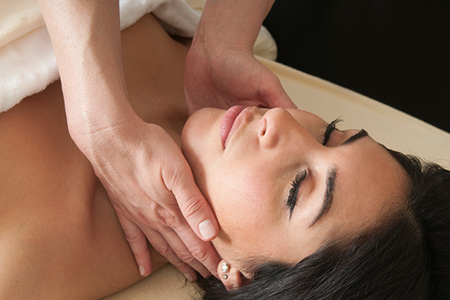By Cathy Ulrich

Six months after hip replacement surgery, Larry was learning to walk again and life was returning to normal. But one thing still puzzled him. When he stood for any length of time, his left ankle would swell, and when the inflammation was at its worst, his right ankle would also swell.
“I can understand why my left leg is swollen,” he says. “But why would my right leg swell? I didn’t have surgery there. And why am I getting swelling six months after the surgery? Shouldn’t it be better by now?” The answer is that although Larry’s surgery had occurred on the opposite side, the right leg would swell when the inflammation became too much for the left side to handle.
Fortunately, lymphatic massage can help address Larry’s problems. This special type of bodywork, while very gentle and seemingly superficial, helps restore function to the lymph system and balance the body.
The Lymph System
Most people are familiar with the body’s vessel system that carries blood to and from the tissues, but few understand there is another equally vital system of vessels that removes cell wastes, proteins, excess fluid, viruses, and bacteria. The lymph system picks up fluids and waste products from the spaces between the cells and then filters and cleans them.
Like the roots of a tree, the lymph system starts as tiny vessels--only a single-cell wide--that eventually branch into larger and larger tubes that carry these fluids back to the blood stream. This network of delicate vessels and lymph nodes is the primary structure of the immune system. The lymph nodes act as check points along the pathways of the vessels. They filter the fluid (called lymph) and serve as the home for lymphocytes—little Pac Man-like cells that attack and destroy foreign bacteria and viruses and even abnormal cells, like cancer cells.
When the lymph system works well, we feel healthy and have a strong defense against illness. When it’s sluggish or blocked—say after surgery or an injury—we can have swelling, feel tired, and be more susceptible to colds and infections.
Lymphatic Massage
A customized form of bodywork, lymphatic massage may help the lymph system do its job better. By understanding the anatomy and function of this delicate system, your massage therapist can assist your body in clearing sluggish tissues of waste and swelling.
Though lymph vessels are found throughout the body, most of them—about 70 percent—are located just below the skin. These fragile vessels work to pick up fluids between the cell spaces when gentle pressure is applied to them from increased fluid build-up, muscle contractions, or the pressure of a therapist’s hands. By using very light pressures in a rhythmic, circular motion, a massage therapist can stimulate the lymph system to work more efficiently and help it move the lymph fluids back to the heart.
Furthermore, by freeing vessel pathways, lymphatic massage can help retrain the lymph system to work better for more long-term health benefits.
Massage therapists versed in lymphatic drainage therapy, an advanced form of lymphatic massage, can identify the rhythm, direction, and quality of the lymphatic flow and remap drainage pathways.
Who Should Get It?
Lymph massage can benefit just about everyone. If you're feeling tired and low on energy, or if you've been sick and feeling like your body is fighting to get back on track, lymph massage would likely serve you well.
In addition, athletes, surgical patients, fibromyaliga and chronic fatigue sufferers, as well as those wanting a fresh look may want to consider lymphatic massage. Here's why.
After a sports injury or surgery, lymph vessels can become overwhelmed with the demand placed on them. When tissues are swollen, deep tissue techniques may actually cause damage to the lymph vessels and surrounding structures. Lymphatic massage is often the treatment of choice, because it helps the body remove proteins and waste products from the affected area and reduce the swelling. This helps reduce pressure on cells and allows them to reproduce faster to heal the body.
Surgical procedures involving lymph node removal--such as breast cancer surgery--can cause limbs to swell. Severe limb swelling needs the attention of a medical team, but in milder cases, lymphatic massage alone may be enough to prevent or even treat the swelling. It’s important that your doctor be involved in your care. Let your doctor know you’d like to see a massage therapist and make sure you have medical approval.
Lymph massage can also be part of a care program for fibromyalgia or chronic fatigue syndrome. Because it's so gentle, it is well tolerated by these patients, who are often experiencing sore trigger points throughout the body. And by encouraging lymph flow and removing waste products, this gentle form of bodywork can help restore immune function and improve vitality.
Estheticians are trained in a very specific form of lymphatic massage. When you get a facial, your esthetician will gently massage your face to help improve lymph flow. When lymph is moving freely in the face, you’ll have clearer, healthier skin without a buildup of toxins and fluids.
So, if you’re feeling a bit sluggish, experiencing mild to moderate swelling, recovering from a sports injury, or interested in optimizing your lymph system for stronger immunity, ask your massage therapist about lymphatic massage. It can have a powerful impact on your body’s ability to heal.




